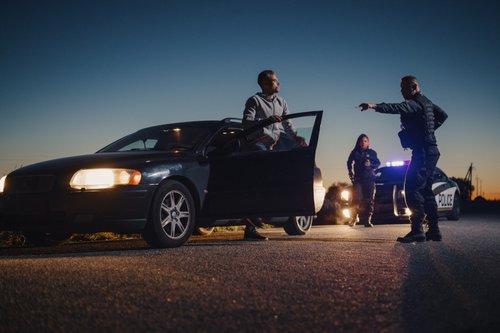Do Ontario Police Need a Warrant to Search a Car During a DUI Stop?

If you follow Greater Toronto Area news, you've probably noticed that coverage of DUI arrests only seems to make the news when related to a traffic accident or if a DUI stop leads police to lay other charges, like for drugs. A recent case in point involved a Brampton Police RIDE (Reduce Impaired Driving Everywhere) checkpoint that arrested two men on drug trafficking and possession charges. While the driver apparently passed any roadside sobriety and drug testing, a seatbelt violation led police to search the vehicle after officers "noticed drugs."
Whether Brampton Police honestly "noticed" the drugs or may have taken, ahem, liberties in searching the car won't be known unless the issue is addressed at trial. However, Ontario Police sure do tend to find a lot of drugs during their DUI stops. And this begs the question: When conducting DUI stops, do Ontario Police need a search warrant to search the driver's vehicle for contraband or evidence relating to potential impaired driving?
With expertise in Canada's DUI laws, the criminal defence lawyers of TorontoDUI will tell you that the answer to this question is nuanced and depends on specificalities of the police DUI stop. Let's examine this issue and flesh out the nuances of vehicle searches during DUI stops.
Police Searches Subject to Charter of Rights Purview
Canadian police authority to conduct searches and seize evidence is limited by Section 8 of the Canadian Charter of Rights and Freedoms , which states:
"Everyone has the right to be secure against unreasonable search and seizure."
This seems simple enough, but the Charter doesn't define what constitutes "unreasonableness," so the courts had to weigh in. In Hunter v. Southam Inc., [1984] 2 S.C.R. 145 , Canada's Supreme Court held that a police search breaches the unreasonable threshold if it violates a reasonable persons privacy expectations. Noting that the purpose of Section 8 of the Charter is to protect a person's reasonable expectation of privacy, the justices ruled the extent of this expectation must be weighed against the government's need to enforce the law. Other high court rulings have further clarified this ruling.
Given Section 8 and the high court's interpretation of a person's "reasonable expectation of privacy," police are limited in how they are allowed to lawfully conduct searches. In most cases, police must secure a search warrant from a judge or justice of the peace if they want to search someone's property. Exceptions under which police can conduct a warrantless search include:
- If a person gives "informed" consent to the search—i.e., informed as in understands their rights and the implications of voluntarily consenting to the search.
- Incident to an arrest, police can search the suspect and the immediate surroundings for weapons or evidence.
- If there is an immediate risk to public safety or the threat of evidence destruction.
- When police see evidence of a crime in plain view.
- If police believe someone is in immediate danger.
Warrantless Searches of Motor Vehicles
Based on these exceptions, police can lawfully conduct warrantless searches of motor vehicles involved in a DUI arrest under most circumstances. Once police have charged someone with DUI, they can search the driver's car if they have reasonable cause. Which in the case of a DUI by alcohol or drugs, might mean searching for alcohol or drug evidence that supports other evidence of the impairment. However, courts have held that such searches should be limited in scope, which means, for example, that police would have no basis for searching a vehicle's locked trunk.
The threshold for conducting a warrantless search is higher for those who've been stopped by a DUI checkpoint or pulled over for suspected impaired driving but have not yet been arrested. In R v. Mellenthin [1992] 3 SCR 615 , the high court's ruling limits warrantless searches of those detained during a police spot check for impairment, licensing, insurance, and vehicle safety. While the court held that a visual inspection of the interior of a car does not constitute a search, police questioning that compelled the owner to open a gym bag and the subsequent search based on viewing suspected drug vials violated Section 8 of the Charter.
Noting that the police questioning constituted part of the search because it was unrelated to the spot check's purpose, the justices said, "[t]he unreasonable search carried out here is the very kind which the court wished to make clear is unacceptable. A check stop does not and cannot constitute a general search warrant for searching every vehicle, driver and passenger that is pulled over. Unless there are reasonable and probable grounds for conducting the search, or drugs, alcohol or weapons are in plain view in the interior of the vehicle, the evidence flowing from such a search should not be admitted."
Courts have also held that police cannot lawfully search a DUI suspect's vehicle based on their consent because the suspected impairment of the driver essentially makes such consent "uninformed." In other words, the police cannot have it both ways—either the driver is impaired and cannot provide informed consent, or the driver can provide informed consent, which means they are not impaired and should be free to go.
How an Unlawful Police Search May Affect a DUI Case
If a DUI defendant can prove that police conducted an unlawful search of their vehicle, it might not be enough to convince a judge to dismiss the charges based on Charter Rights violations. Section 24(2) of the Charter allows judges to exclude any evidence uncovered by an unlawful search, but that will not likely cover breathalyzer readings and other evidence used to prove impairment. However, if the unlawful search was especially egregious or excessive, a judge can dismiss the charges due to the severity of the Charter Rights breach and send a message to police that such behaviour will not be tolerated.
For Top-Notch DUI Defence in the GTA, Contact TorontoDUI
If you've been arrested for DUI in the Greater Toronto Area, secure top-notch defence with our crack legal team of DUI experts. We have a stellar 15-plus-year track record of successfully defending thousands of Ontario clients against DUI charges. To start strategizing an effective defence, contact TorontoDUI for a free consultation.
